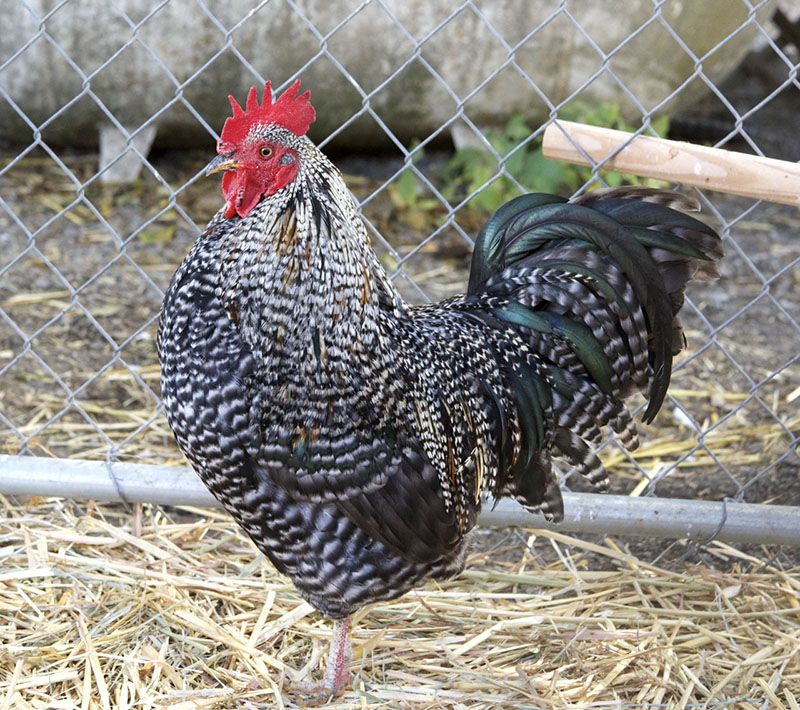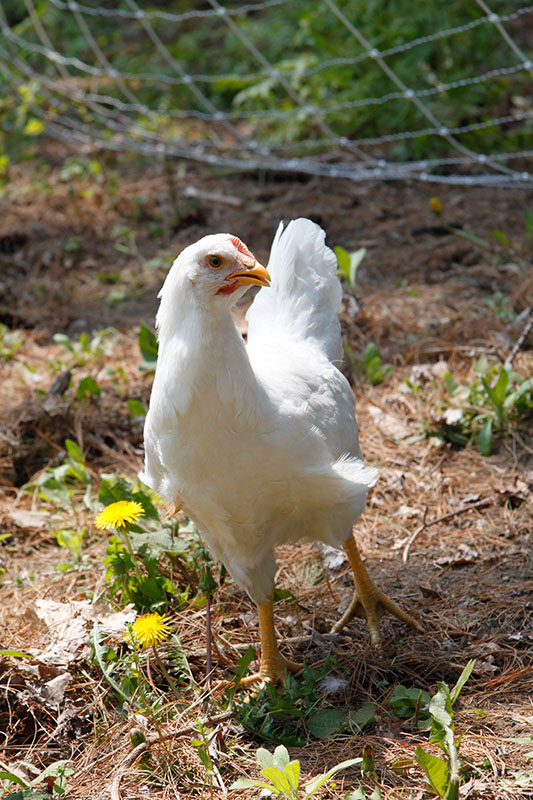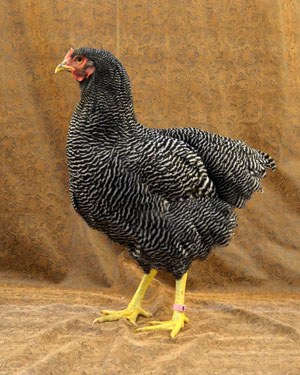Plymouth Rock Chickens
 The Plymouth Rock was developed in America in the middle of the 19th century and was
first exhibited as a breed in 1869. Several individuals claimed its invention, using
crosses of Dominique, Java, Cochin, and Brahma. The first Plymouth Rock was barred and other varieties developed later. The Breed
became popular very rapidly, and in fact, until World War II, no breed was ever kept
and bred as extensively as the Barred Plymouth Rock. Its popularity came from its
qualities as an outstanding farm chicken: hardiness, docility, broodiness, and excellent
production of both eggs and meat. Most of the other varieties were developed from
crosses containing some of the same ancestral background as the barred variety. Early
in its development, the name Plymouth Rock implied a barred bird, but as more varieties
were developed, it became the designation for the breed. The Barred Plymouth Rock
was one of the foundation breeds for the broiler industry in the 1920's.
The Plymouth Rock was developed in America in the middle of the 19th century and was
first exhibited as a breed in 1869. Several individuals claimed its invention, using
crosses of Dominique, Java, Cochin, and Brahma. The first Plymouth Rock was barred and other varieties developed later. The Breed
became popular very rapidly, and in fact, until World War II, no breed was ever kept
and bred as extensively as the Barred Plymouth Rock. Its popularity came from its
qualities as an outstanding farm chicken: hardiness, docility, broodiness, and excellent
production of both eggs and meat. Most of the other varieties were developed from
crosses containing some of the same ancestral background as the barred variety. Early
in its development, the name Plymouth Rock implied a barred bird, but as more varieties
were developed, it became the designation for the breed. The Barred Plymouth Rock
was one of the foundation breeds for the broiler industry in the 1920's.
Characteristics
 Plymouth Rock are a good general farm chicken. They are docile, while showing some
broodiness. They possess a long, broad back and a moderately deep, full breast. They
have a single comb of moderate size. Some strains are good layers while others are
bred principally for meat. They usually make good mothers. Their feathers are fairly
loosely held but not so long as to easily tangle. Generally, Plymouth Rocks are not
extremely aggressive, and tame quite easily. Some males and hens are big and active
enough to be quite a problem if they become aggressive. Breeders should be aware of
the standard weights and not select small or narrow birds for the breeding pen. Common
faults include shallow breast, high tails, narrow bodies and small size.
Plymouth Rock are a good general farm chicken. They are docile, while showing some
broodiness. They possess a long, broad back and a moderately deep, full breast. They
have a single comb of moderate size. Some strains are good layers while others are
bred principally for meat. They usually make good mothers. Their feathers are fairly
loosely held but not so long as to easily tangle. Generally, Plymouth Rocks are not
extremely aggressive, and tame quite easily. Some males and hens are big and active
enough to be quite a problem if they become aggressive. Breeders should be aware of
the standard weights and not select small or narrow birds for the breeding pen. Common
faults include shallow breast, high tails, narrow bodies and small size.
Standard Weights
Cock: 9.5 lbs
Hen: 7.5 lbs
Cockerel: 8 lbs
Pullet: 6 lbs
Varieties
- Barred
- White
- Buff
- Partridge

- Silver Penciled
- Blue
- Columbian
Skin Color
Yellow.
Egg Shell Color
Brown.
References
Chicken Breeds and Varieties (A2880), John L. Skinner, University of Wisconsin-Madison
The Livestock Conservancy PO Box 477, 33 Hillsboro St, Pittsboro, NC 27312
